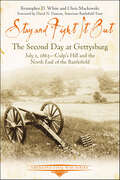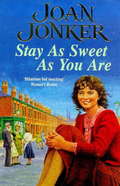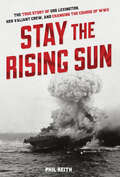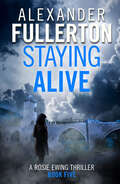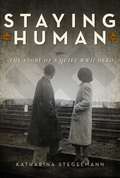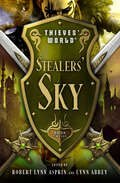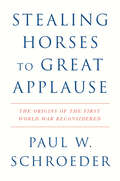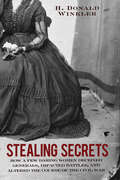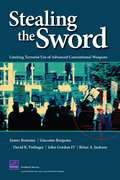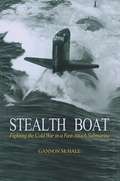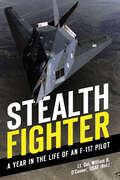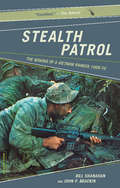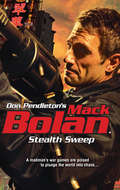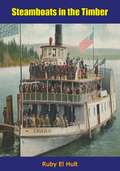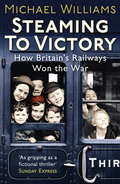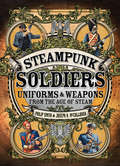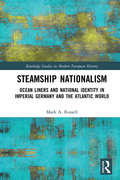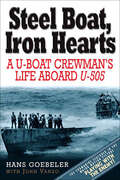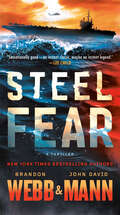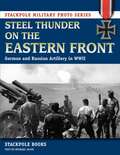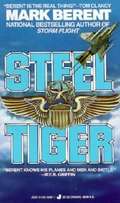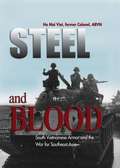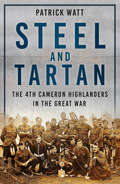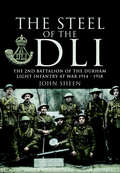- Table View
- List View
Stay and Fight it Out: The Second Day at Gettysburg, July 2, 1863, Culp’s Hill and the North End of the Battlefield (Emerging Civil War Series)
by Chris Mackowski Kristopher D. WhiteRecounts the often-overlooked fight that secured the Union position and set the stage for the Gettysburg battle’s fateful final day. July 1, 1863, was a disaster for the Union army’s XI Corps. Shattered in battle north of the Pennsylvania town of Gettysburg, the battered and embarrassed unit ended the day hunkered at the crest of a cemetery-topped hill south of the village. Reinforcements fortified the position, which extended eastward to include another key piece of high ground: Culp’s Hill. The Federal line also extended southward down Cemetery Ridge, forming what eventually came to resemble a long fishhook. July 2 saw a massive Confederate attack against the southernmost part of the line. As the Southern juggernaut rolled inexorably northward, Federal troops shifted away from Culp’s Hill and Cemetery Hill to meet the threat. Just then, part of the Army of Northern Virginia’s vaunted Second Corps launched itself at the weakened Federal right. The very men who had broken the Union army the day before resolved to break it once again. The ensuing struggle—every bit as desperate and with stakes every bit as high as the more famous fight at Little Round Top on the far end of the line—imperiled the entire Union position. “Stay and fight it out,” one Union general counseled his peers. The Confederates were all too willing to oblige. Authors Kristopher D. White and Chris Mackowski started their Gettysburg account in Fight Like the Devil: The First Day at Gettysburg, July 1, 1863, and continued it in Don’t Give an Inch: The Second Day at Gettysburg, July 2, 1863—From Little Round Top to Cemetery Ridge. Picking up on the heels of its companion volume, Stay and Fight It Out: The Second Day at Gettysburg, July 2, 1863—Culp’s Hill and the Northern End of the Battlefield recounts the often-overlooked fight that secured the Union position and set the stage for the battle’s fateful final day.
Stay as Sweet as You Are: A heart-warming family saga of hope and escapism
by Joan JonkerA warm and loving Liverpool community come to the rescue of an unhappy young girl. Joan Jonker, beloved author of the Molly and Nellie series, gives a touching insight into the life of a close-knit community in Stay as Sweet as You Are - a story that is sure to stay with you long after you have finished the last page. Perfect for fans of Lindsey Hutchinson and Dilly Court. With the face of an angel and a sunny nature, Lucy Mellor is a daughter any parent would be proud of. But Lucy only knows cruelty from the woman who brought her into the world. Her father, Bob, is the one shining light in her life. He tries to protect her, but he is no match for the devious wife who gives him no peace of mind and has no love for his daughter. The walls of the house are thin and Ruby Mellor's angry attacks on Lucy can be heard by their neighbours. One day, Irene Pollard decides she must do something, and she takes the girl under her wing. And two doors up, Mrs Aggie and her seafaring son, Titch, enrich Lucy's life with their sense of fun. But Lucy still craves a mother's love... What readers are saying about Stay as Sweet as You Are: 'With this book you feel that you are actually living alongside the characters. You laugh with them and cry with them, literally! Hilarious and sad. Joan Jonker depicts life as it really is, full of ups and downs. Never in my life have I read a book where I have laughed and cried so much. The dialogue and characters are so witty and life like, they are people that I hope I will come across at some stage during my life. Salt of the earth!' 'I feel I'm living with these wonderful characters, brilliant read'
Stay in Your Own Back Yard: A touching saga of love, family and true friendship (Molly and Nellie series, Book 1)
by Joan JonkerTwo families are united in love and friendship, yet will ambition threaten their future happiness? Joan Jonker introduces Nellie McDonough and Molly Bennett, two of her most popular characters, for the first time in this heart-warming Liverpool saga, Stay in Your Own Back Yard. Perfect for fans of Katie Flynn and Sheila Newberry.In her terraced house in Liverpool, Molly Bennett struggles to bring up four children on her husband's meagre wage. But Molly doesn't complain; she has an abundance of things money can't buy - and a home filled with love and laughter. When her eldest daughter, Jill, is offered a place at high school, Molly is racked with guilt. She needs Jill working to relieve their poverty. But Jill eases Molly's conscience by getting herself a job in a baker's shop while signing up for night school. Molly's best mate is Nellie McDonough; they spend hours laughing, gossiping and lending a helping hand to others. And when they discover one of their neighbours is being beaten by her violent husband, the friends roll up their sleeves and take action. Meanwhile, Jill starts dating Nellie's son, Steve, and both families are delighted. But Jill lands herself an office job that takes her into a world beyond the confines of their close-knit community and she and Steve seem to be drifting apart... What readers are saying about Stay in Your Own Back Yard: 'If you want a feel good factor book then get in your comfy chair and snuggle up. Joan Jonker will make you laugh, and she will make you cry. But she will leave you wanting more and more of her books''Great story and characters. A funny, friendly and lovely family story. You are carried away and become part of the family'
Stay the Rising Sun: The True Story of USS Lexington, Her Valiant Crew, and Changing the Course of WWII
by Phil KeithA “well-written, superbly researched” account of a WWII aircraft carrier’s demise in the Pacific—and the legacy left by the “Lady Lex” (CPL Vincent L. Anderson, USMC, Marine Detachment, USS Lexington, survivor of the Battle of the Coral Sea).In May 1942, the United States’ first naval victory against the Japanese in the Coral Sea was marred by the loss of the aircraft carrier USS Lexington. Another carrier was nearly ready for launch when the news arrived, so the navy changed her name to Lexington, confusing the Japanese.The men of the original “Lady Lex” loved their ship and fought hard to protect her. They were also seeking revenge for the losses sustained at Pearl Harbor. Crippling attacks by the Japanese left her on fire and dead in the water. But a remarkable ninety percent of the crew made it off the burning decks before Lexington had to be abandoned. In all the annals of the Second World War, there is hardly a battle story more compelling.The ship’s legacy did not end with her demise, however. Although the battle was deemed a tactical success for the Japanese, it turned out to be a strategic loss: For the first time in the war, a Japanese invasion force was forced to retreat. The lessons learned by losing the Lexington at Coral Sea impacted tactics, air wing operations, damage control, and ship construction. Altogether, they forged a critical, positive turning point in the war. The ship that ushered in a new era in naval warfare might be gone, but fate decreed that her important legacy would live on.
Staying Alive (Rosie Ewing Spy Thrillers)
by Alexander FullertonA riveting prequel to the WWII espionage series featuring British agent Rosie Ewing, in this &“meticulously researched war novel&” (Len Deighton). Late autumn, 1942: A group codenamed Countryman are briefed by London to get a certain German out of Vichy&’s hands. What they don&’t know is that they are being sold out to the Gestapo. Of course, they are constantly aware of betrayal as a looming danger. All too many SOE networks have been blown, with agents disappearing into the Gestapo cellars and extermination camps: the dread every agent lives with every minute of every day. In amongst them is Rosie Ewing, about to start a series of extraordinary life-or-death adventures . . .Praise for the writing of Alexander Fullerton: &“The research is unimpeachable.&” —The Sunday Times &“The tension rarely slackens and the setting is completely convincing.&” —The Times Literary Supplement
Staying Human: The Story of a Quiet WWII Hero
by Katharina StegelmannDuring World War II, Heinz Drossel saved Soviet prisoners of war and several Jews, including Marianne Hirschfeld. Again and again, he wasn't afraid to risk his own life when others' safety was at risk. Nearly all of Hirschfeld's family members were murdered by Nazis; she survived in hiding-and met Heinz again by coincidence after the war was over.They married in 1946. At that time, starting over was difficult. In the judicial service, Drossel witnessed Nazis continuing with their careers. As a political prisoner, his father was sent to jail in the Soviet-occupied sector. Drossel and his wife felt like outsiders, but their plans to emigrate fell apart. Drossel first spoke about his brave deeds when he was honored in Yad Vashem in 2000 as Righteous Among the Nations.Author Katharina Stegelmann paints an honest view of Drossel and doesn't idealize her protagonist. Her engaging portrait succeeds in its convincing depiction of individual fate and historical events.
Stealers' Sky (Thieves' World®)
by Diana L. Paxson Robin Wayne Bailey C.J. Cherryh andrew j. offutt John DeCles Duane McGowenThe twelfth entry in the shared-world fantasy series finds wrongs righted, debts paid, and the city swathed in a mysterious dust storm. With the completion of its new wall, Sanctuary seems peaceful and prosperous. The Beysib and Rankan invaders now favor diplomacy over military action. The wharves that once hosted only fishermen are now full of trade ships carrying merchandise to the city, and the streets, once full of warring factions, are calm. But soon warriors are preparing for battle as strong winds out of the desert bring swirling clouds of sand and dust, enveloping the city in chaos. It is the perfect time for thieves to strike . . . The original shared-world fantasy adventure series ends with this collection, featuring stories by some of fantasy&’s best authors like Robert Lynn Asprin, Andrew Offutt, John DeCles, Duane McGowen, Diana L. Paxson, C. J. Cherryh, Robin W. Bailey, and Lynn Abbey.
Stealing Horses to Great Applause: The Origins of the First World War Reconsidered
by Paul W. SchroederStand-out theoretical and empirical explanation of the origins of the First World War by one of the great historians of international diplomacyStealing Horses to Great Applause presents arguably the finest considerations yet of the origins of the First World War. Breaking with accounts which focus on the actions of a single state or the final countdown to hostilities, Paul W. Schroeder describes the systemic crisis engulfing the Great Powers.They were more interested in colonial plunder overseas (stealing horses to great applause, in the old Spanish adage) than the traditional statecraft of European peace-making. Preserving the balance of power required preserving all the essential actors in it, including a tottering Austria-Hungary. This the British in particular failed to recognise. The Central Powers may have started the War but that does not mean they in any real sense caused it. In the end Schroeder recalls the verdict of Shakespeare's Romeo and Juliet: All are punished.Stealing Horses to Great Applause includes appraisals of Niall Ferguson and A. J. P. Taylor, and an extensive unpublished final paper rethinking the First World War as "the last 18th-century war."With an introduction by Perry Anderson.
Stealing Secrets: How a Few Daring Women Deceived Generals, Impacted Battles, and Altered the Course of the Civil War
by H. Donald WinklerClandestine missions. Clever, devious, daring. Passionately committed to a cause. During America's most divisive war, both the Union and Confederacy took advantage of brave and courageous women willing to adventurously support their causes. These female spies of the Civil War participated in the world's second-oldest profession--spying--a profession perilous in the extreme. The tales of female spies are filled with suspense, bravery, treachery, and trickery. They took enormous risks and achieved remarkable results--often in ways men could not do.
Stealing the Sword: Limiting Terrorist Use of Advanced Conventional Weapons
by David R. Frelinger Brian A. Jackson James Bonomo Giacomo BergamoExamines how terrorists make technology choices and how the United States can discourage terrorists' use of advanced conventional weapons. Concludes that the United States should urgently start discussions with key producer nations and also decide on an architecture needed to impose technical controls on new mortar systems that should enter development soon.
Stealth Boat
by Gannon MchaleThe mission of the U.S. Navy's fast attack submarines during the Cold War was a closely guarded secret for many years, but this look back at the period and the part played by those submarines in winning the war gives readers a close-up view of life in one of those subs, USS Sturgeon (SSN637). McHale's memoir covers the years from 1967 to 1970, when as a teenager he was assigned to the nuclear submarine. Readers come to understand how those years profoundly affected the way he lived the rest of his life. The book focuses on McHale's experiences and those of other men with whom he served who have remained his lifelong friends.
Stealth Fighter: A Year in the Life of an F-117 Pilot
by William B. O'ConnorAn engaging look into the culture of those who fly high-tech fighters and bombers and one pilot’s personal account of his career in the cockpit. The F-117 Stealth Nighthawk was a truly groundbreaking aircraft when introduced in the early 1980s. The strange shape of the jet, all flat panels and angles, rendered the aircraft nearly invisible to radar. This highly classified program wasn’t acknowledged publicly by the U.S. Air Force until 1988. The Nighthawk was retired in 2008 after twenty-five years of service, including bombing missions over Panama, Iraq during both Gulf Wars, and Yugoslavia during the Kosovo war. Brad O’Connor flew the Nighthawk during the NATO bombing campaign over Kosovo in 1999. His first-person experience puts the reader in the cockpit of this revolutionary combat aircraft. From his F-117 assignment through training, deployment, mission planning, and combat flights, O’Connor relates the day-to-day life of a pilot in the world’s first stealth fighter.
Stealth Patrol: The Making of a Vietnam Ranger
by Bill Shanahan John P. BrackinBill Shanahan was troubled by his line company duty in Vietnam: whenever his unit went on patrol, the North Vietnamese Army and Viet Cong could hear them coming. His unit didn't have a chance against an enemy that quietly emerged from the jungle like ghosts-and just as quickly disappeared. Shanahan wanted a better way to fight. . . and to stay alive. And so, just four months after he arrived in Vietnam in 1968, he joined the LRPs (Long Range Patrol). The mission of the Lurps, as they were called, was dangerous: Five- or six-man teams were dropped into the dense forest behind enemy lines. They were to observe enemy troop movements and stage ambushes that sometimes ended in fierce firefights. When their mission was over, they called for quick helicopter rescue. Back on base, they debriefed and tried to sleep off the adrenaline. Two days later they were back in the brush. The missions changed, but one goal was always the same-stay alive. In hard-hitting prose, Bill Shanahan, with co-author John Brackin, tells his story of survival behind enemy lines.
Stealth Sweep
by Don PendletonA rogue mastermind from Chinese Intelligence has the resources to execute an attack for world domination. Remote-controlled stealth-attack drones carrying nuclear bombs are being smuggled into strategic strike points, and Mack Bolan must terminate the conspiracy before the bombs are released.
Steamboats in the Timber
by Ruby El HultIn the heyday of its water commerce, Lake Coeur d’Alene in northern Idaho was the scene of more steamboating than any other lake, salt or fresh, west of the Great Lakes. The old steamers brought gold, silver, and lead from the mines; lumber from the forests; mail to lonely homesteaders; and romance down the shadowy St. Joe River, whose silken waters flow into the Coeur d’Alene. The old steamboats are gone now from the lake—but here is their story, exciting, nostalgic and complete.Across Lake Coeur d’Alene, in the early days, the big mining boom in the Coeur d’Alene Mountains was carried out, and the ore-hauling stammers came and went. Across the lake water went the timber seekers in their rush to grab the white pine riches of the St. Joe country; and a new fleet of stammers carried timber barons, homesteaders and lumberjacks up the twisting, cottonwood-shaded St. Joe.On holidays the old stammers were transformed into excursion boats. The beauty of the mountain lake and its two rivers lured thousands of people from Spokane and the Palouse farmlands, who crowded into special trains and headed for the banner-draped boats. Gay crowds danced on deck, children had a hectic day, and amorous couples gazed languorously at the blue-and-silver waters as the excursion steamer trailed homeward in the moonlight.Here you will visit the bustling waterfront boom towns of Coeur d’Alene, Harrison, St. Maries, Ferrell, and St. Joe, just as they were in the glory days of steamboating, and as they are today. Romantic and factual history skilfully merge as the old towns, the rivermen, and the boats glide by in easy, informed narrative.
Steaming to Victory: How Britain's Railways Won the War
by Michael WilliamsIn the seven decades since the darkest moments of the Second World War it seems every tenebrous corner of the conflict has been laid bare, prodded and examined from every perspective of military and social history. But there is a story that has hitherto been largely overlooked. It is a tale of quiet heroism, a story of ordinary people who fought, with enormous self-sacrifice, not with tanks and guns, but with elbow grease and determination. It is the story of the British railways and, above all, the extraordinary men and women who kept them running from 1939 to 1945. Churchill himself certainly did not underestimate their importance to the wartime story when, in 1943, he praised ‘the unwavering courage and constant resourcefulness of railwaymen of all ranks in contributing so largely towards the final victory.’ And what a story it is. The railway system during the Second World War was the lifeline of the nation, replacing vulnerable road transport and merchant shipping. The railways mobilised troops, transported munitions, evacuated children from cities and kept vital food supplies moving where other forms of transport failed. Railwaymen and women performed outstanding acts of heroism. Nearly 400 workers were killed at their posts and another 2,400 injured in the line of duty. Another 3,500 railwaymen and women died in action. The trains themselves played just as vital a role. The famous Flying Scotsman train delivered its passengers to safety after being pounded by German bombers and strafed with gunfire from the air. There were astonishing feats of engineering restoring tracks within hours and bridges and viaducts within days. Trains transported millions to and from work each day and sheltered them on underground platforms at night, a refuge from the bombs above. Without the railways, there would have been no Dunkirk evacuation and no D-Day.Michael Williams, author of the celebrated book On the Slow Train, has written an important and timely book using original research and over a hundred new personal interviews.This is their story.
Steampunk Soldiers
by Philip Smith Joseph McculloughSteampunk Soldiers is a unique pictorial guide to the last great era of bright and colorful uniforms, as well as an important historical study of the variety of steam-powered weaponry and equipment that abounded in the days before the Great War of the Worlds.Between 1887 and 1895, the British art student Miles Vandercroft travelled around the world, sketching and painting the soldiers of the countries through which he passed. In this age of dramatic technological advancement, Vandercroft was fascinated by how the rise of steam technology at the start of the American Civil War had transformed warfare and the role of the fighting man. This volume collects all of Vandercroft's surviving paintings, along with his associated commentary on the specific military units he encountered.
Steamship Nationalism: Ocean Liners and National Identity in Imperial Germany and the Atlantic World (Routledge Studies in Modern European History)
by Mark A. RussellSteamship Nationalism is a cultural, social, and political history of the S.S. Imperator, Vaterland, and Bismarck. Transatlantic passenger steamships launched by the Hamburg-Amerikanische Packetfahrt-Aktien-Gesellschaft (HAPAG) between 1912 and 1914, they do not enjoy the international fame of their British counterparts, most notably the Titanic. Yet the Imperator-class liners were the largest, most luxurious passenger vessels built before the First World War. In keeping with the often-overlooked history of its merchant marine as a whole, they reveal much about Imperial Germany in its national and international dimensions. As products of business decisions shaped by global dynamics and the imperatives of international travel, immigration, and trade, HAPAG’s giant liners bear witness to Germany’s involvement in the processes of globalization prior to 1914. Yet this book focuses not on their physical, but on their cultural construction in a variety of contemporaneous media, including the press and advertising, on both sides of the Atlantic. At home, they were presented to the public as symbolic of the nation’s achievements and ambitions in ways that emphasize the complex nature of German national identity at the time. Abroad, they were often construed as floating national monuments and, as such, facilitated important encounters with Germany, both virtual and real, for the populations of Britain and America. Their overseas reception highlights the multi-faceted image of the European superpower that was constructed in the Anglo-American world in these years. More generally, it is a pointed indicator of the complex relationship between Britain, the United States, and Imperial Germany.
Steel Boat, Iron Hearts: A U-boat Crewman's Life Aboard U-505
by Hans Goebeler John VanzoThe story of the German submarine U-505 and its dramatic capture by the US Navy during WWII—told by one of its crewmen.Hans Goebeler is known as the man who “pulled the plug” on U-505 in 1944 to keep his beloved U-boat out of Allied hands. Steel Boat, Iron Hearts is his no-holds-barred account of service aboard a combat U-boat. It is the only full-length memoir of its kind, and Goebeler was aboard for every one of U-505’s war patrols.Using his own experiences, log books, and correspondence with other U-boat crewmen, Goebeler offers rich and very personal details about what life was like in the German Navy under Hitler. Because his first and last posting was to U-505, Goebeler’s perspective of the crew, commanders, and war patrols paints a vivid and complete portrait unlike any other to come out of the Kriegsmarine. He witnessed it all: from deadly sabotage efforts that almost sunk the boat to the tragic suicide of the only U-boat commander who took his life during WWII; from the terror and exhilaration of hunting the enemy to the seedy brothels of France. The vivid, honest, and smooth-flowing prose calls it like it was and pulls no punches.U-505 was captured by Captain Dan Gallery’s Guadalcanal Task Group 22.3 on June 4, 1944. Trapped by this “Hunter-Killer” group, U-505 was depth-charged to the surface, strafed by machine gun fire, and boarded. It was the first enemy ship captured at sea since the War of 1812. Today, hundreds of thousands of visitors tour U-505 each year at the Chicago Museum of Science and Industry.Includes photos and a special Introduction by Keith Gill, Curator of U-505, Museum of Science and Industry
Steel Fear: A Thriller
by John David Mann Brandon WebbAn aircraft carrier adrift with a crew the size of a small town. A killer in their midst. And the disgraced Navy SEAL who must track him down . . . The high-octane debut thriller from New York Times bestselling writing team Webb & Mann—combat-decorated Navy SEAL Brandon Webb and award-winning author John David Mann.&“Sensationally good—an instant classic, maybe an instant legend.&”—Lee ChildThe moment Navy SEAL sniper Finn sets foot on the USS Abraham Lincolnto hitch a ride home from the Persian Gulf, it&’s clear something is deeply wrong. Leadership is weak. Morale is low. And when crew members start disappearing one by one, what at first seems like a random string of suicides soon reveals something far more sinister: There&’s a serial killer on board. Suspicion falls on Finn, the newcomer to the ship. After all, he&’s being sent home in disgrace, recalled from the field under the dark cloud of a mission gone horribly wrong. He&’s also a lone wolf, haunted by gaps in his memory and the elusive sense that something he missed may have contributed to civilian deaths on his last assignment. Finding the killer offers a chance at redemption . . . if he can stay alive long enough to prove it isn&’t him.
Steel Thunder on the Eastern Front (Stackpole Military Photo Series)
by Michael Olive Stackpole BooksVisual history of the artillery used by both sides on the Eastern Front in World War II.
Steel Tiger
by Mark BerentVietnam, 1967. America's most daring fighter pilots faced their greatest challenge in a desperate war.... Now on his second tour, Major Court Bannister is haunted by a new, more determined breed of enemy and haunted by his brother's shocking act of treason. Captain Toby Parker fights a personal battle against alcohol, while flying on the edge of disaster, and Lieutenant Colonel Wolf Lochert wages a crossed border war against all enemies, regardless of their uniform they wear.
Steel and Blood
by Ha Mai VietCol. Ha Mai Viet presents a historically accurate and detailed account of the Vietnam War from the perspective of the South Vietnamese armor forces. Highly decorated for his valor and leadership of the armored units, the author spent ten years documenting what went on so he could offer an analysis of the war based on facts. He interviewed hundreds of people, including all senior South Vietnamese officers involved and many of lesser rank, as well as American advisers. Viet tells the story without glossing over the shortcomings of his fellow soldiers. His efforts serve as an invaluable record of his army's organization, combat operations, and interaction with U.S. advisers. Published in cooperation with the Association of the United States Army.
Steel and Tartan: The 4th Cameron Highlanders in the Great War
by Patrick WattIn the summer of 1914 Scotland prepared for war.Steel and Tartan charts the adventures of the 4th Battalion, Queens Own Cameron Highlanders – from their training in Bedford with the Highland Division through to five major engagements in France, including the Battle of Neuve Chapelle and the Battle of Loos, to eventual break-up in March 1916 at the hands of the British Army administrators. Of the 1,500 men who fought with the Battalion, over 250 were killed and either buried in one of the many British war cemeteries in France or else left where they fell, their names etched on one of the memorials to the missing.Using previously unpublished diaries, letters and memoirs together with original photographs and newspaper accounts, Patrick Watt tells the story of the gallant officers and men of the 4th Camerons: those ‘Saturday night soldiers’ who went so eagerly to war in August 1914.
Steel of the DLI: Second Battalion of the Durham Light Infantry at War 1914–1918
by John SheenThe 2nd Battalion of the Durham Light Infantry was one of only two battalions of the regiment that did not have its history published in some form after the Great War, the other was the 1/7th (Territorial) Battalion. As the regular Home Service battalion of the regiment it was brought up to strength with Regular Reservists and men from the Special Reserve and went out to France in September 1914, where it fought at the Battle of the Aisne, before moving north to Flanders. The battalion was in action immediately that war was declared on 4th August 1914, when a detachment based at South Shields boarded a German Steamer on the River Tyne and took the crew prisoner and marched them through the town to the Police Station.The book includes material from unpublished letters and diaries of both officers and men and has lots of photographs from the Regimental Archives, a number of which show named officers and men in the trenches around Armentierres in 1915. Also included is a roll of all the officers that served with the battalion with date of joining and leaving the battalion. For the other ranks the original 1914 Star men are included in a roll that includes reinforcements that joined up to 1 November 1914. This roll has been crossed referenced against the South Africa Rolls to show those who had seen service in that campaign also. There is also a list of those that received gallantry awards. This must be one of the first histories of a regular battalion that fought in France during the Great War, published since the 1920s.
